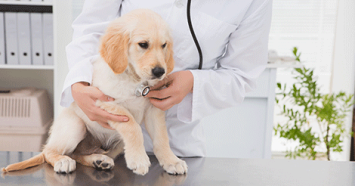
When you take your puppy or kitten to the veterinarian for a check-up and vaccine boosters, your vet will perform a physical examination. This check-up is very important to ensure that your pet is growing normally and that no medical issues exist. A common part of the physical exam is to listen to your pet’s heart with a stethoscope to make sure the heart is beating correctly. Sometimes during this part of the exam an unusual heartbeat known as a heart murmur is heard.
What is a heart murmur?
The traditional “thump-thump” sounds of the heartbeat are caused by the opening and closing of the heart’s valves. These valves act as doorways between heart chambers and between the heart and certain blood vessels, which enables blood to flow through the heart and out to the body. Dogs and cats have four heart chambers, just like humans. A heart murmur is heard when the traditional heartbeat sounds are abnormal. While murmurs have different sounds and rhythms depending on what is causing them, the resultant sound is due to turbulence or disruption of normal blood flow.
Can I insure my pet if they have a heart murmur?
Pets with heart murmurs certainly can and should still be insured. Any issue that comes up in the future that is directly related to the murmur would not be covered; however, depending on the type of murmur, some cardiac conditions could still be covered. Once you are a policyholder, please request a medical history review and Embrace will let you know up front what would be excluded.
Types of Heart Murmurs in Pets
Innocent Murmurs
Some murmurs are considered innocent murmurs or physiologic murmurs, meaning that they are not associated with heart disease. This type of murmur is often associated with blood circulating or moving rapidly through the heart. This can occur in very excited puppies or kittens, puppies or kittens who are sick from an unrelated illness (e.g., anemia or respiratory tract infections), or it may be due to the position the puppy or kitten was in at the time the veterinarian listened to them.
Studies have shown that up to 20% of puppies and kittens will have an innocent murmur at one or more of their early check-ups. Most innocent murmurs resolve or are absent by six months of age. If your puppy or kitten has an innocent murmur at a veterinary visit, it is highly unlikely that this will affect their heart or their lifespan in the future.
Pathologic Murmurs
Pathologic murmurs are usually due to a congenital heart condition, also known as a heart defect. During development in the mother’s uterus, the heart initially forms to handle circulation of blood to and from the placenta, without using the lungs. As growth continues, the heart creates connections to communicate with the lungs and allow oxygen to be carried to the red blood cells and circulate blood throughout the body after birth. Also during growth in the uterus, the heart develops the walls and valves that will make up their four-chambered heart.
Heart defects that result in a murmur occur when these new connections or chambers do not develop correctly. The murmur sound heard is usually associated with blood flowing through an unclosed hole in the heart wall chamber, past an obstruction within the heart, or backward through a valve.
Symptoms of a Heart Murmur
It is common for puppies and kittens to act normal and not show any symptoms of a heart murmur. Even with very severe murmurs, the puppy’s or kitten’s circulatory system works to keep blood flowing properly. Over time, often later in adulthood, the circulatory system and heart begins to struggle to keep blood flowing properly and signs of heart failure are more likely to be seen such as:
Cough
Struggling to breathe
Inability to exercise
Heart murmur symptoms in puppies and kittens usually include poor growth. The pet will be smaller and thinner than is normal for their age (he or she may be the runt of the litter). Puppies and kittens with heart murmurs may also get tired more easily or won’t play as much as a normal young animal.
Treatment of Heart Murmurs
Innocent murmurs can be monitored at each veterinary visit. If symptoms develop or if the murmur doesn’t improve with time, this could be an indicator the murmur is not innocent and needs to be addressed. If your veterinarian suspects that a heart murmur is a pathologic murmur, he or she will recommend an echocardiogram to determine what type of heart defect is present. This is an ultrasound to visualize the heart chambers and vessels. Radiographs (X-rays) and an electrocardiogram (ECG) may also be recommended to help show if severe heart disease is present.
In puppies, patent ductus arteriosus, pulmonic stenosis, and subaortic stenosis are the most common types of heart defects that will cause a pathologic murmur. In kittens, ventricular septal defect is more common. Some of these defects can improve with time, some require surgery, and some require medications to help the heart work properly. The treatment needed will depend on the severity of the defect and the severity of symptoms.
If your puppy or kitten has a heart murmur, it is likely that he or she is not a good candidate for breeding. Heart defects that cause a murmur are often an inheritable condition, meaning that the puppy or kitten can pass on the defect to his or her offspring. Mild heart defects in one pet could be more severe in the next generation of pets.
If you have any questions or concerns about heart murmurs in your puppy or kitten, be sure to call your veterinarian. He or she will be able to discuss your concerns with you and help you determine what can be done to keep your puppy or kitten as healthy as possible.